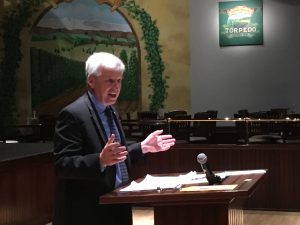By Dave Waddell
Desperate to get help for his mentally ill son, journalist Pete Earley told Chicoans Saturday he did things he never thought he’d do.
Earley said he lied about what his son had said, violated his own professional ethics by threatening to summon feared investigative reporter Mike Wallace of “60 Minutes” TV fame, and “literally went out and grabbed a doctor” from a crowded emergency room hallway to evaluate his delusional son.

Pete Earley
Eventually, Earley’s wife advised him that he couldn’t help his son, Kevin, as a parent, but that he could as a journalist. “For once, I listened to her,” Earley said.
The product was his 2007 book, “Crazy: A Father’s Search Through America’s Mental Health Madness,” a finalist for a Pulitzer Prize. Earley, a former Washington Post reporter and author of 15 books, writes a weekly blog about mental health. The National Alliance on Mental Illness (NAMI) of Butte County brought Earley to Chico, and he spoke May 5 to about 75 people at Sierra Nevada’s Big Room, bringing some to tears.
“Recovery is possible; I’ve seen it with my own eyes,” Earley said. “But these illnesses are like cancer, and not everyone gets healthy.”
Earley commented – at least indirectly — on a couple of issues in the news locally.
Asked during an audience question-and-answer period about “Laura’s Law,” a state law that allows for court-ordered assisted outpatient treatment that NAMI is promoting for adoption in Butte County, Earley came across as ambivalent.
“Laura’s Law in some cases can force (people into) treatment, or in other cases turn them off,” he said.
Earley also poked fun at police in Fairfax County, Va., where he resides, for having a mobile crisis unit that’s in operation only during daytime hours.
“Who has a mental health breakdown from 8 to 6?” asked Earley, to laughter from the audience.
The Chico Police Department and Butte County Behavioral Health recently started a pilot mobile crisis team that operates on a similar schedule to Fairfax.
Among the pieces of advice Earley gave to the parents of mentally ill children was to “speak up and participate in the process.” Earley noted that while Kevin had some doctors who helped his son immeasurably, there were a couple of others “who about killed him.”
He also called on family members to recognize that while they are suffering from a loved one’s mental illness, that pain “does not compare with what that person is going through.”
Prior to showing a video that featured his son, Earley noted that Kevin had been arrested three times and hospitalized on five occasions. Once, after finding Kevin shot by a stun gun and hogtied by police, Earley admitted feeling that “it’d be better if he’d never been born.”
Yet today Kevin is completing graduate school while working as a “peer support recovery specialist” helping others living with mental illness in Fairfax.
“My goal is to make their lives better,” Kevin says in the video, which also shows off his skills as a rap musician, his words sometimes carrying a forceful mental health message.
Dave Waddell is news director at ChicoSol.

Thanks for the great article Dave. The biggest barrier to the mentally ill recovering, in my opinion, has been the underfunding in California of psychiatric beds and outpatient Treatment slots. Additionally, the cost of running County operated behavioral health programs is simply too high. It may have been a good idea to develop California’s mental health system at the county level in 1969 when the LPS Act was implemented and we did not have enough trained mental health professionals but that is no longer the case. Both private and public Behavioral Health resources must come to the table to design a cost-effective program to meet the need in Butte County.